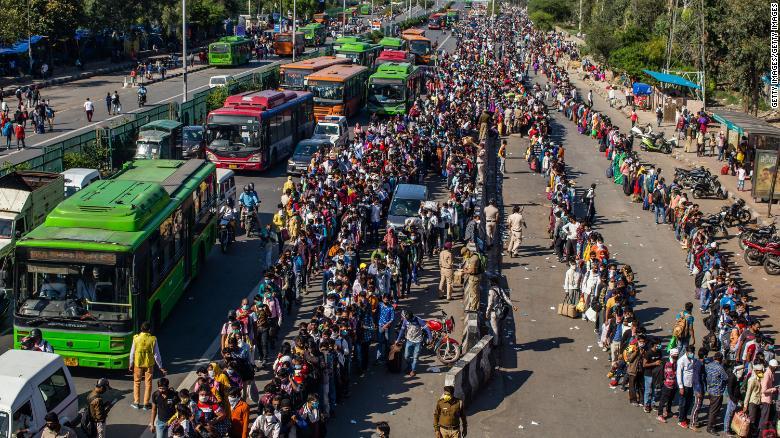Covid-19 Mass Exodus: The Best We Can Do?

Representational image. | Image Courtesy: CNN
The rulers of the day have turned a medical emergency into a human nightmare. The people are being subjected to the worst forms of abuse. Shots of migrant workers and daily-wagers are everywhere—they are being sprayed with poisonous disinfectants, walking hungry and weary and forlorn, only to be humiliated and thrashed by lathi-swinging constables who seem to be the new rulers of the day.
A Jaipur-based artisan tells me, in all earnestness, that in today’s India only two types of people can survive like human beings—“politicians and police-wallahs”.
Let us come to the point: a pandemic is a medical emergency. It is meant to be tackled administratively. But in India, writ large is the police presence. It is the policemen and women who are taking over all possible roles related to an epidemic. Why? Is it essential that the lives of all Indians have to be controlled by force and brute force alone?
People are not taking pleasure, it must be said, in witnessing or experiencing this total control of the police. Two very recent images have left them anguished. One is of a policeman scrawling, with a huge black pen, the details of the lockdown right across a young boy’s forehead. The other image, which belongs to some Dark Age, is of policemen ruthlessly thrashing a group of young Muslim boys who had gone to a mosque to offer namaaz. Instead of explaining or even scolding them for stepping out of their homes, they unleashed lathis and threats.
With this sudden lockdown, the lives of our countrymen are endangered. Even before the Novel Coronavirus decides to strike, the system is has struck us all, in one way or another. Those oft repeated one-liners that you get to hear in the Kashmir Valley are now being repeated everywhere: ‘Does this sarkar wants this stretch of land with its people or without its people?’
Indeed, with people dying, unfed and uncared for, what would remain of this land? Already, a strange, eerie quiet stretches out all around us. After all, rations and food packets will not be despatched from the skies! So, people are decidedly hushed. They are anxious over what the immediate future will bring. And what lies ahead for the factories and mills and warehouses which are all shut? People are wondering—even those who have the resources to procure supplies—how long will stocks last? And the answer, which they are afraid to acknowledge even to themselves, is: Not for very long!
India’s political rulers have been exposed like never before. To suddenly announce a lockdown without even a basic preparedness is akin to dictating that there will be no more food or water or shelter, and no money either, after four short hours. It is every man, woman and child for herself. Rattled and fearing for their children’s survival, the poorest Indians decided to walk on and on, uncaring of the consequences. They were left with nothing to lose but their own lives. If they were unsure of what new disaster would come their way, they soon found the answer when they encountered the force and diktat of the lathi.
Even during the Partition, relief camps were functioning with food and shelter bandobasts. If that level of preparedness was possible in 1947, then why was it not possible today, in 2020? What about the funds collected by the government in the name of relief work and outreach schemes? Will they reach our people today? Or the day after, when they are gone or going? Now that people are refugees in their own country, do we have a plan for them that will actually work?
We have become a weak and fragile people, physically and emotionally cloistered—but yes, some voices can still be heard. They are asking: is this how you combat a medical emergency? Is this how you treat your citizens? Is this what South Korea and Japan did to combat this virus? If everybody else did better, why are we doing worse? No other nation silenced its farmers and workers and labourers like India has. And we, who judge our neighbours and the far-off world harshly all the time—is this the best we can do?
It would be naïve to expect anything but hollow and shallow assurances intermingled with political speeches from you-know-who. Yet, it is certain that more and more people have stopped taking the words from our political masters seriously. They are running for their lives—who has the time or inclination to hear more speeches?
The ongoing crisis reminds of the Rohingyas fleeing Myanmar not too long ago and the manner in which we treated them: brutally and shabbily.
Ironical, is it not, to recall today that more than half of New Delhi’s population had been refugees at one stage? If not today’s residents, many of our parents and grandparents had fled from undivided Punjab during the Partition. Yet, the Centre’s brazen attitude towards refugees is matched only by the callousness of many of North India’s residents.
The condition of the Rohingya refugees, for the record, remains unchanged. They are surviving like the out-castes of yore, in North Indian towns and also in the capital city, New Delhi. We have been mute spectators to their plight, and now many of us share their condition.
Just this week, I received a message from a well-known WhatsApp group dedicated to human rights. It had an appeal:
‘...I am writing to you to seek your assistance. 146 Rohingya refugee families living in the jhuggis of Kalinidi Kunj are starving! They do not have enough food supplies, they do not have work owing to Covid-19.
No outside support from civil society or the like. They either live at our love or die at our indifference. Please contribute to provide them with food supplies for a month...’
On another note, New Delhi-based poet and author Jayshree Misra Tripathi, wrote a verse in the early hours of 28 March 2020, against the backdrop of the realities of today. To quote from her poetic lines: “The images of migrant workers, carrying a few belongings, walking away from the city in throngs, has filled me with such dark despair. Another picture of an inhuman policeman making young boys, with bags on their backs, squat and jump a few paces at a time, to the border, fills me with shame. They naturally want to return home.
There are no daily wages for them during the lockdown. No proper homes to live in. So, they walk to the bus terminus. The buses are full, so they walk on. I could not help but wonder what thoughts must be flitting through their troubled minds. How unkind are we in these desperate times—with the imminent fear of death from the Covid-19 virus?”
And what about those who live by themselves? Who is to understand their angst?
The author is a freelance journalist and commentator. The views are personal.
Get the latest reports & analysis with people's perspective on Protests, movements & deep analytical videos, discussions of the current affairs in your Telegram app. Subscribe to NewsClick's Telegram channel & get Real-Time updates on stories, as they get published on our website.























